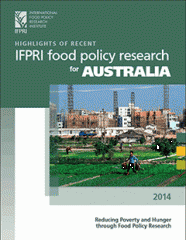With support from Australia, IFPRI conducts innovative research in areas such as agricultural markets, climate change, and tools and scenarios to improve food security.
Agriculture and rural development play a critical role in alleviating poverty and undernutrition. The Australian Department of Foreign Affairs and Trade (DFAT) has focused its efforts on three pillars of food security: improving agricultural productivity, increasing rural livelihoods, and improving community resilience. This demonstrates Australia’s commitment to serving the needs of the poorest and constructing the building blocks of global food security in the long-term. In 2013-2014, the Australian government’s spending on food security is expected to total more than 316 million Australian dollars.
Successful collaboration between IFPRI and Australia, as highlighted in a recent brochure, has led to numerous outcomes in food policy research and national development strategies. The following are some examples of recent projects that reflect the valuable partnership between IFPRI and Australia:
- The IFPRI research monograph Food Security, Farming, and Climate Change to 2050 informed Transforming Rural Land Use (Update Paper 4 of the Garnaut Climate Change Review, Australia, 2011), which discussed the implications of climate change for food security.
- Research on public investment in China, funded by Australia, was a catalyst for opening the International Center for Agricultural and Rural Development, jointly launched by the Chinese Academy of Agricultural Sciences and IFPRI in 2003. The Center supports evidence-based, pro-poor decisionmaking in China and promotes policy dialogue and mutual learning among China and other nations.
- The results of the Australia funded project “Vietnam: Improving the Competitiveness of Pig Producers” influenced the draft of Vietnam’s strategy for agriculture and rural development to 2020 with a vision to 2030, which was approved by the prime minister in 2012.







